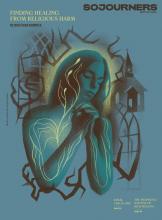RICH MULLINS HAD a museum of a personality. The singer-songwriter, who died in a car accident in 1997, loved to show off anything he found interesting, his friends say. From music to movies to the places he traveled, Mullins loved “for you to experience what he loved,” his friend and collaborator Mitch McVicker told Sojourners.And more than just about anything else, Mullins loved Jesus.
Mullins’ career tracked alongside the evolution of contemporary Christian music (CCM), which went from marginal in the 1970s to a powerhouse genre that sold a combined 31 million albums in 1996. Best known for the modern hymn “Awesome God,” Mullins wrote his fair share of songs that fit Christian radio. But more often, his music was a kaleidoscope of faith and humanity, offering a tour of human frustration and failure.
On “Hard to Get,” Mullins, as modern psalmist, asks God, “Do you remember when you lived down here, where we all scrape to find the faith to ask for daily bread? / Did you forget about us, after you had flown away?”
In other places, Mullins plays minor prophet. “I wrote this for the Religious Right,” he declared before singing that Jesus “came without an axe to grind [and] did not toe the party line,” during a performance of “You Did Not Have a Home.”
Read the Full Article

